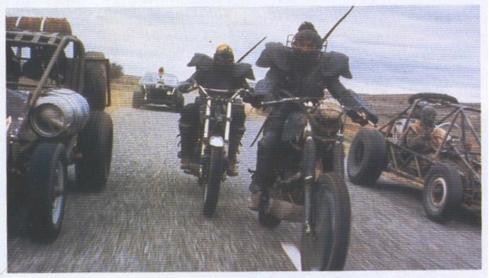Making heroes out of the people who fly all over the world for business is killing them. There has to be a better way.


10 IT Job Search Habits To Nail A New Gig
10 IT Job Search Habits To Nail A New Gig (Click image for larger view and slideshow.)
My frequent flier status is more elite than yours, but don't feel bad. It will probably kill me.
Researchers at the University of Surrey have written a paper on the dangers of our business culture, which glorifies business travel. The authors call this phenomenon "hypermobility," and note that it is typically glamorized and encouraged in privileged societies.
The study identifies four very real negative tolls that life as a road warrior takes on our bodies and our lives -- physically, psychologically, emotionally, and socially.
Yet, we all glorify the road warrior. No, not this road warrior:
Though that is cool, I was talking about the road warrior who lives like this:

(Image: ChrisDag via Flickr)
We glorify them at the airport by awarding them super-duper elite status and letting them board first so they have ample room for their steamer-trunk-sized carry-ons. We do it in movies, where we show the glamorous life of the (usually male) business traveler talking to a pretty flight attendant while she pours him another Scotch and soda. Most importantly, we glorify it in our own offices, when we marvel at someone who says, "I flew to Singapore six times last week." In break rooms all over the world there are "my miles are greater than your miles" contests. The winner is always the one who travels the most.
The study shows we get social credit for being able to say we've flown the furthest or the fastest or the most. We're seen as cosmopolitan, sophisticated, and experienced. We're seen as important, because the company doesn't pay to fly any schmo all over the world.
Here's the thing: All that social credit comes with a very real cost, one that enterprises probably would rather you not think about. All that travel will kill you, literally -- and if it doesn't kill you, it can ruin your life.
[ Leisure travel is OK. Read How to Keep Your Job From Ruining Your Vacation. ]
Let's get it out of the way now. Frequent flying is dangerous to your health. Flying long distances can lead to deep vein thrombosis, which can lead to blood clots and strokes. You are exposing yourself to an array of ever-nastier germs from all over the world, as global jets become flying pandemic carriers. Flying actually forces some of the genes that govern your immune system to stop working, making it easier to get sick and also to have a heart attack. Those who travel most age faster than those who travel less. If you had a twin who never flew, that twin would age slower than you if you are a frequent traveler.
Nothing is as scary as this: If you fly more than 85,000 miles per year, you are beyond the regulatory limit for exposure to radiation facilities. That's roughly the equivalent of taking seven trips from New York to Tokyo, or flying across the country every three weeks. How many people do you know who travel once a month across the country? In most frequent flyer programs, 85,000 miles will not qualify you for "elite" status. To get to super-duper elite, special grand poobah status on most airlines, you need to essentially live in an X-ray machine without lead-lined underwear. To put it another way, flight crews are exposed to more radiation than nuclear power plant workers.
That isn't even accounting for accumulated fatigue from jet lag. It can take as many as 11 days to recover from an international flight. Jet lag causes changes in your sleep patterns, gastrointestinal workings, and heart function. Accumulated fatigue is shown to affect your driving skills as much or more than driving above the legal limit for alcohol. There are no exact numbers on traffic deaths related to driving while jet lagged, but the authors make a fairly good case for the fact that statistically it is likely that they exist.
Haven't heard enough yet? How about this: Frequent travel puts stress on your work and home life. Constant travel can lead to emotional displacement or "travel disorientation." Since business travel doesn't usually excuse people from their daily workloads, it can lead to "inbox fatigue" and a growing sense that they can never catch up. The frequent stress of travel delays and potential missed connections can accumulate as well.
Perhaps the worst stress, of course, is family related. Missed social connections can strain a family relationship. You'll missing birthdays or special events. You'll spend days at home, but you'll be emotionally disconnected because you're recovering. All this takes a toll on the family.
In other words, the road warrior mentality is terrible for you. Stop comparing frequent flier miles. If you are a manager, try to limit travel, or at least space it in healthier ways. This isn't about being macho. It is a matter of life and death. A sometimes long, slow, and painful death which is hard to connect back to the travel, but death nonetheless. This is perfect example of how we often divorce the consequences of something bad for us from the cause because the two factors aren't happening at the same time. The danger is real. The reason for the danger is entirely made by us. Time for a change.
About the Author(s)
You May Also Like







